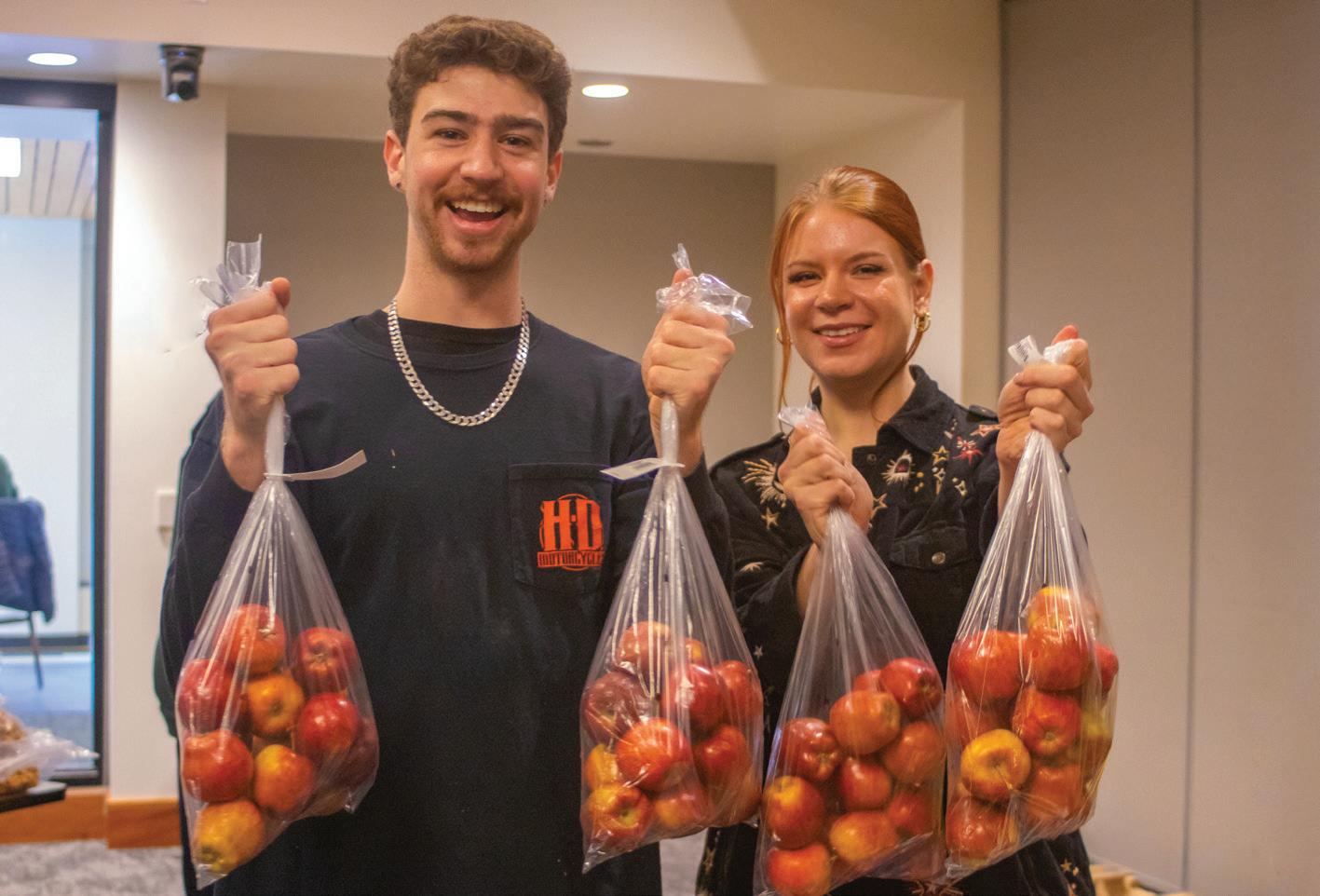






The Humanize Podcast tackles racial divide in Boulder and beyond P. 18





REDPILLED AND RAGING P. 6
NED MINE REOPENING? P. 8
STUDENT HUNGER AT CU P. 10
























FOOD
Appetizers/Tapas
Asian Fusion
Bagel
Bakery
BBQ
Breakfast/Brunch
Burger
Business Lunch
Catering
Chinese Restaurant
Donuts
Fine Dining Restaurant
Food Hall
Food Truck
Gluten-Free Menu
Ice Cream/Frozen
Yogurt
Indian/Nepalese Restaurant
Italian Restaurant
Japanese Restaurant
Kid-Friendly Restaurant
Lyons Restaurant
Mexican Restaurant

Teahouse
Wine Selection
HOME & GARDEN
Pancake/Waffle
Pizza
Place to eat outdoors
Place to go on a first date
Restaurant Dessert
Restaurant Service
Sandwich
Seafood
Sushi Restaurant
Take-out
Thai Restaurant


Veggie Burger Wings
DRINKS
Bar
Beer selection
Cidery Cocktails
Coffee Shop
Coffee Roaster
Craft Brewery
Distillery
Happy Hour
Margarita
Arborist
Carpet/Flooring
Electrician
Florist
Furniture Store
Heating, Venting, and Air Conditioning
Home Builder/Contractor
Home Finishing
Home Improvement
Hot Tub/Spa
Kitchen Supply Store
Landscaper
Mattress Store
Nursery/Garden Center
Painter
Pest Control
Plumber
Roofing Contractor
Solar Company
ENTERTAINMENT & CULTURE
Art Gallery
Bank/Financial Institution
Festival/Event
Live Jazz Venue











Non-Profit
Open Mic
Place to Dance
Place to Work Remote
Private School
Sports Bar
FITNESS & HEALTH
Acupuncture Clinic
Barber Shop
Chiropractor
Climbing/Parkour Gym
Dance Studio
Day Spa
Dental Care
Golf Course
Gym/Fitness Center
Hair Salon
Hospital
Lasik Services
Martial Arts
Massage Medical Doctor
Nail Salon
Orthodontist

























My ex-roommate and I were in her Toyota 4Runner with her boyfriend when he started yelling at her for wanting to buy a brand-new motorcycle with her own money. After I chimed in and told him to stop, he querulously urged her to pull over at the nearest gas station to “cool off.”
Finally, he left the car. In between sobs, she apologized to me. I turned to her, having experienced this myself.
“I know you might not listen to me, but this is going to get worse,” I said. “I love you as a friend, and you do not deserve this.”
MARCH 20, 2025 Volume 32, Number 31
PUBLISHER: Stewart Sallo
EDITORIAL
EDITOR-IN-CHIEF: Shay Castle
ARTS EDITOR: Jezy J. Gray
REPORTERS: Kaylee Harter, Tyler Hickman
CONTRIBUTING WRITERS: Rob Brezsny, Michael J. Casey, Anjeanette Damon, Jason Gonzales, Myra Kirk, John Lehndorff, Kate Coleman-Minahan, Dan Savage, Toni Tresca, Chase Woodruff
COVER: Courtesy: The Humanize Podcast
SALES AND MARKETING
DIRECTOR OF ADVERTISING: Kellie Robinson
SENIOR ACCOUNT EXECUTIVE: Matthew Fischer
ACCOUNT EXECUTIVES: Chris Allred, Austen Lopp
SPECIAL PROJECTS MANAGER: Carter Ferryman
MRS. BOULDER WEEKLY: Mari Nevar
PRODUCTION
CREATIVE DIRECTOR: Erik Wogen
GRAPHIC DESIGNER: Chris Sawyer
CIRCULATION
CIRCULATION MANAGER: Cal Winn
CIRCULATION TEAM: Sue Butcher, Ken Rott, Chris Bauer
BUSINESS OFFICE
BOOKKEEPER: Austen Lopp
FOUNDER / CEO: Stewart Sallo
BY MYRA KIRK
It didn’t take long for me to contemplate moving out. I got out of the lease
hastily, emailing her parents about the concerning behaviors I witnessed. While I don’t blame my ex-roommate, the environment wasn’t conducive to my own wellbeing. I don’t want to live with a Nazi who prolifically uses the n-word and excuses yelling at women. I could no longer stand her boyfriend “shadow-boxing,” or rather, throwing fake punches at me so that I’d flinch, insisting on hoisting me in the air out of nowhere, and yelling about how he craves to take my life. Although many like to pigeonhole domestic violence survivors into a slender category of personality, of being “too nice,” my ex-roommate contravened those stereotypes. She
As Boulder County’s only independently owned newspaper, Boulder Weekly is dedicated to illuminating truth, advancing justice and protecting the First Amendment through ethical, no-holds-barred journalism and thought-provoking opinion writing. Free every Thursday since 1993, the Weekly also offers the county’s most comprehensive arts and entertainment coverage. Read the print version, or visit boulderweekly.com. Boulder Weekly does not accept unsolicited editorial submissions. If you’re interested in writing for the paper, please send queries to: editorial@ boulderweekly.com. Any materials sent to Boulder Weekly become the property of the newspaper.
1495 Canyon Boulevard, Suite CO 1, Boulder, CO 80302 Phone: 303.494.5511, FAX: 303.494.2585 editorial@boulderweekly.com www.boulderweekly.com
Boulder Weekly is published every Thursday. No portion may be reproduced in any form without written permission from the publisher. ©2025 Boulder Weekly, Inc., all rights reserved.
Boulder Weekly welcomes your correspondence via email (letters@boulderweekly.com). Preference will be given to short letters (under 300 words) that deal with recent stories or local issues, and letters may be edited for style, length and libel. Letters should include your name, address and telephone number for verification. We do not publish anonymous letters or those signed with pseudonyms. Letters become the property of Boulder Weekly and will be published on our website.
rocked a mullet and skater JNCO jeans, revving and tinkering with her motorcycle constantly. She was a badass, and the farthest from weak. But her boyfriend whittled her into someone I did not recognize.
I have carried some guilt surrounding not convincing her that he was dangerous, which women are socialized to do while most men seemingly sit idly by. The situation made me reflect on the toxic string of behaviors I’ve seen with young men today.
There is a common thread with men like this: They live and breathe propaganda. Jobless at 25 years old, relying on disability compensation as an exMarine, my roommate’s boyfriend would lounge on the couch blaring right-wing mumbo jumbo from YouTube.
One version of this extremist media, among Gen Z, is “red-pilled” content. Epistemologically, it budded from The Matrix, where misogynists interpreted the film as reflective of our society in the sense that men do not hold privilege. They believe that to escape the grain of this “matrix,” one must take the red pill and jettison respect for women.
“Women are agents of the matrix, and they’re not letting you fight back,” claims Andrew Tate in his garishly superficial videos, where he is often shirtless or parading his watches. Tate now faces human trafficking and sexual misconduct charges in Romania. He and many others are at the head of the red-pilled dominion, rallying boys as young as 13 into a lifestyle of contempt.

Despite its trans directors publicly stating the film is a metaphor for gender transition, the choice main character Neo makes in The Matrix has been interpreted by many as waking up to the truth of conservative ideology.
Courtesy: Warner Bros.
GOT SOMETHING TO SAY?
Boulder Weekly accepts letters and op-eds from residents of Boulder County on issues they find important.
Social media sites almost beckon for these ideologies to take root, with gendered algorithms that pantomime stereotypes. Sites promote sex and soft porn to men, and beauty and fashion to women. This breaches into politics, with female users receiving 11% more content about 2024 presidential candidate Kamala Harris than men, accord-
First, read the rules (bit.ly/OpinionRulesBW).
Then, get writing!
• Letters: Under 350 words
• Op-eds: Under 750 words
SEND YOUR HOTTEST TAKES TO letters@boulderweekly.com
ing to The Washington Post Online echo chambers reinforce those beliefs, or rather play on confirmation bias, and disseminate fake news to make profit. This is especially prevalent with YouTube Shorts, Instagram Reels and TikTok, where younger demographics are more likely to consume news videos. Using similar language to white supremacists, many who consume this content are drawn toward an alt-right ideology that shares a deep disdain for women and feminism.
One of the best-known influencers of this red-pilled parade is Nick Fuentes,
who criticized JD Vance for having an Indian wife, but is celebrated as a Trump supporter. He has said of women seeking the presidency: “Glass ceiling? It’s a ceiling of bricks; you’ll never make it. Never going to happen, sweetie. Your body, our choice.”
Comments like these rose up to 4,600% on the social media platform X (formerly Twitter) following the election, according to reporting from PBS. These guys see Trump as an emblem of triumph over women.
Both my ex-boyfriend and my exroommate’s were equally infatuated with Elliot Rodger, who is a 22-year-old mass-murderer. He killed six people, including two sorority girls, in California and attributed the acts to vengeance toward a reality where he is “denied” sex and love. He even wrote a 141page manifesto on his virginity and unhinged views on women.
Yet another element of men’s disillusionment is that they abhor women who aren’t virgins, yet they consume pornog-
raphy like madmen. In being desensitized, they have outrageous — often Eurocentric — standards on who is nubile, or “looksmaxxed,” and who isn’t. Hypocritically, they generalize that all women care about is a man’s looks while they pick apart a woman’s appearance. Hubs for these men and young boys are forums like 4Chan. Unsurprisingly, my ex-roommate’s boyfriend would frequent 4Chan, and tried to persuade me to join so that I could find a boyfriend like him. One of the most egregious examples on this trend of online misogyny was a chat with 70,000 men detailing how they would rape a woman.
Now the themes of Margaret Atwood’s The Handmaid’s Tale don’t seem too far-fetched. As Atwood wrote, “may the Lord open” the minds and hearts of young men today, before it is too late.
Myra Kirk is a junior majoring in journalism at CU Boulder. She is currently an intern and multimedia journalist at Bucket List Community Café.




Your local news at a glance
BY TYLER HICKMAN
Longmont Democrat Katie Wallace, a former federal policy advisor for Congressman Joe Neguse, was selected to fill the vacant Senate District 17 seat Tuesday, March 18.
The SD17 vacancy committee, consisting of 114 D17 Democrats, elected Wallace from a field of nine candidates during the virtual vacancy meeting. She won 59.8% of the vote.
“Through 13 years of grassroots organizing in our neighborhoods and making policy on behalf of us in both the State House and Congress,” Wallace said during the meeting, “I learned that change happens when we listen first, act second and never stop fighting for what’s right.”
The senator-elect said she would push for stronger environmental regulations and “an aggressive shift toward renewable energy,” more affordable housing in the community, funding for public services and protections for immigrants.
Wallace will fill the seat vacated by Sen. Sonya Jaquez-Lewis, who resigned amid an ongoing ethics probe to take a job for a women and LGBTQ+ advocacy nonprofit earlier this year.
The 2025 legislative session is scheduled to conclude May 7, but Wallace will serve in the seat until at least the 2026 election.
The U.S. Department of Government Efficiency (DOGE) will terminate two leases in Boulder worth almost $1 million in their efforts to slash government spending.
The terminations were published on the DOGE website along with over $9.4 million and 335,000 square feet of other leased space in Colorado, according to KDVR
One lease, located at 3215 Marine St., is $913,334 annually for 29,170 square feet, and the other at 4725 Nautilus Court was listed at $49,575 and 3,830 square feet. Both were being leased by the U.S. Geological Survey (USGS).
The lease at 3215 Marine St., located inside the CU Boulder Marine Street Science Center, was a mix of 50% office and administrative space, 40% lab space and 10% storage, said CU spokesperson Nicole Mueksch. The lease will be terminated effectively on Aug. 31.
The building at 4725 Nautilus Court, an industrial warehouse, was largely used as storage for files and did not house any personnel, according to Gibbons-White, the commercial real estate brokerage firm for the facility. The lease will be terminated as of June 1, said brokerage vice president MichaelRyan McCarty.
It is unclear how many USGS employees will be affected by these terminations. “We do not comment on personnel,” said a USGS spokesperson. “USGS remains committed to its congressional mandate as the science arm of the Department of the Interior.”
A spokesperson for the U.S. General Services Administration (GSA), which oversees government leased property, added “Acting Administrator [Stephen] Ehikian’s vision for GSA includes reducing our deferred maintenance liabilities, supporting the return to office of federal employees, and taking advantage of a stronger private/government partnership in managing the workforce for the future.”
A Nederland mine could restart operations after mining activities were paused in 2022 due to heavy metals leaking into water sources and a failure to report water quality data.
The Colorado Division of Reclamation, Mining, and Safety (DRMS) is accepting public comments through April 2 as they determine whether Cross Mine — a gold and silver mine located 4.5 miles west of Nederland along Coon Track Creek, whose waters eventually flow into Barker Reservoir — meets regulations
as a Designated Mining Operation (DMO).
The mine, acquired by Grand Island Resources (GIR) in 2017, was issued a cease-and-desist order from DRMS in 2022 in response to excessive traces of lead and copper found in the watershed from December 2020 to August 2021, and a failure to submit pollutant reports in March and April 2021.
After the violations were reported, stage regulators determined that Cross Mine met the definition of a DMO, requiring stricter regulations for the operation due to potential exposure of toxic or acid materials during mining operations.
“The nature of the materials … they are handling and moving has led to water quality impairment, which is why they’re treating water,” said Michael Cunningham, Director of DRMS. “By virtue of that, we made our determination that they were a DMO.”
After completing corrective measures, the DRMS Mined Land Reclamation Board found GIR to be in compliance. The order was lifted Jan. 18, 2023. Now, GIR is applying to restart mining operations, and a decision on the application is currently scheduled for July 6.
The new application proposes a permit area of 205 acres, an increase of nearly 195 acres from GIR’s initial permit for 8.95 acres. While DRMS is still in
the early stages of reviewing the application, Cunningham said “it is not, I guess, apparent from an initial read of the application, exactly what all that additional area would be utilized for in a future mining operation.”
According to the application, identified reserves could support the annual extraction rate of 70,000 tons of material and could continue for the next 50 years.
For residents, worries are mounting about GIR’s plans to resume mining, said Emily Wolf, who owns property off Caribou Road three miles downstream from the mine.
“There’s a group of neighbors who are seriously concerned about this,” Wolf said. “It’s the creek that I own property on, where my son used to play. People along there have animals who drink out of the creek, and most people along there have wells.”
“Water quality is a concern. This company now has a significant history of water pollution in the past.”
Since exceedances were first found in wastewater discharge from the mine in 2021, GIR installed an updated water treatment system that meets state and federal regulations.
Residents can submit public comments via mail sent to DRMS at 1313 Sherman St. Room 215 Denver, CO 80203 or by calling 720-665-0836.



CU Boulder’s Buff Pantry to relocate next fall as SNAP faces proposed federal funding cuts
BY KAYLEE HARTER
Ramen, ramen and more ramen.
That’s the stereotypical college diet — but CU Boulder’s Basic Needs Center is working to ensure that isn’t the norm.
“The sort of entrenched trope around college students and their eating is that they are expected to eat less nutritionally dense types of foods, something cheap, easy to make,” said Hannah Wilks, interim assistant dean of students. “Part of the reason why we started some of these food resources is [because] that’s persistent and pervasive within our culture.”
The Buff Pantry, housed within the Basic Needs Center, offers fresh, shelfstable and frozen foods along with personal care items. Students can visit once a week.
Last year, a survey of more than 8,000 graduate and undergraduate students at CU Boulder found that 25% of students
were food insecure, according to Wilks, which the center defines as “a lack of access to affordable, nutritious and culturally relevant food in a quantity that supports the active and healthy lifestyle students need to be successful.”
Since Wilks started the pantry in 2020, more and more students have been making use of it. The current space in the basement of University Memorial Center has seen a 370% increase in visitation since the 2020-21 academic year, with more than 11,439 visits total in 2023-24. On average, the pantry serves over 400 students each week, Wilks said.
Now, the pantry is set to move to the Center for Community (C4C) next year, where it will have more space and refrigeration capacity to serve more students.
“There’s a reality in which we don’t have the capacity to serve, right now, every student,” she said. “If 25% of the


student population that has food insecurity came to us, we would not have enough resources to provide that currently.”
But not all students who may need the resources are using them, likely in part due to attitudes around seeking assistance.
“There’s still stigma in seeking services,” she said. “We hear often, ‘Well, yeah, I need that, but if other people need it more than me, then they should get it,’” she said. “We want students to know that there is no judgment from us about coming to get these types of services.”
The pantry is open to all students, regardless of need — something Wilks and her colleagues at the Basic Needs Center hope destigmatizes seeking the services. Wilks said about 10% of the students visiting the pantry “don’t have a problem obtaining food from a financial perspective.”
“Convenience wise, this is an easier place for them to get food,” she said. “So if our numbers continue to grow, that is where we will shift some of our eligibility, is that you have to demonstrate some level of food insecurity to be able to access it.”
Wilks said the center is “close to reaching that threshold” in the current pantry, but she hopes the bigger space allows for continuing to serve any student.
The move to the C4C building will also allow for a colocation of different resources Wilks says they often refer students to and vice versa, such as counseling services.
“As they’re dealing with students who
might be in crisis, for them to be able to send someone down to the pantry, or if they know that food insecurity is the major issue, or a thing that’s preventing a student from something, then they will be able to have that access more immediately as well,” she said. “So yeah, good symbiotic relationship.”
The pantry isn’t the only resource the Basic Needs Center offers to fight food insecurity on campus. There are also mobile food pantries open to faculty, staff and members of the broader community; nutrition workshops and a donation program for meal swipes, which are loaded onto student IDs and are good at campus dining centers and grab-and-go locations.
The center also offers SNAP enrollment assistance in partnership with Hunger Free Colorado, a statewide nonprofit. SNAP, often referred to as food stamps, is a federal program administered through the county that provides financial assistance for food.
But SNAP has its own challenges.
In 2022, an estimated 37% of lowincome people in Boulder County accessed SNAP benefits — the lowest of any of Colorado’s 10 biggest counties according to a 2024 report from Hunger Free Colorado.
“In Boulder, there’s a lot of students who might meet the income criteria for SNAP but because of these federal restrictions on student eligibility, might not be out front,” said Carmen Mooradian, a
senior public policy manager from Hunger Free Colorado. “That might make it seem as though there’s a high percentage of folks who are low income and aren’t accessing the program, but it might just be due to federal eligibility criteria.”
Fewer than two in five food insecure students nationally meet the eligibility requirements for the federal food assistance program, according to a 2024 report from the U.S. Government Accountability Office. Even fewer — an estimated 41% of eligible students — receive the benefit.
is open Mondays and Wednesdays 9 a.m. to 2 p.m., Tuesdays noon to 2:30 p.m. and 3-5 p.m., and Fridays noon to 2:30 p.m. and 3-5 p.m. Make an appointment at bit.ly/StudentHungerBW.
To qualify, most students must work 20 hours a week on top of being a fulltime student — though there are other ways to qualify based on childcare responsibilities or disability status.
When Mooradian spoke with Boulder Weekly last year, she advocated for expanding those eligibility requirements so more students can qualify. But now, cuts to SNAP are on the table that could make it harder for students to qualify through more stringent work requirements.
“We have this big societal misperception about who college students are thinking of them as extremely privileged people who might just temporarily have reduced access to economic resources, but who are ultimately benefiting from a lot of privilege,” she said. “The truth is that our student population doesn’t actually look like that. We now have a significant percentage of first-generation students, students of color, non-traditional students who might also be working or have families.”
With such a wide range of situations and needs facing students, Wilks said the goal isn’t to just expand the pantry. Within the next year and a half, Wilks said the center hopes to launch a food recovery program and expand its meal swipe donation program.
“It’s growing and finding some innovative ways that we can address food insecurity that don’t rely on a pantry system,” she said. “It’s not the best way to impact food insecurity for a student. So we need some other ways, like increasing SNAP enrollment and applications.


Hopefully we can maintain that program and the funding from our partner and that program also doesn’t get significant cuts at the federal level this year.”
Between that uncertainty, stigma around accessing resources and entrenched norms around how college students eat, the work of combating hunger on campus is difficult but worthwhile.
“The fact is that hunger is not normal. We shouldn’t be normalizing people’s experiences of food insecurity,” Mooradian said. “Ultimately, everyone deserves to eat, and students who are working to better their lives and secure economically stable futures should have the support they need to do that without having to worry about where their next meal is going to come from.”



BY JASON GONZALES CHALKBEAT COLORADO
The U.S. Department of Education’s Office for Civil Rights announced investigations Friday into 45 colleges and universities, including CU Colorado Springs, that partnered with an organization providing mentorship and support for PhD candidates from underrepresented backgrounds.
The investigations appear to be the first tied to a “Dear Colleague” letter that said the Trump administration would punish colleges and universities if they don’t end scholarships, mentorship programs and networking groups meant to create more opportunities for students of color. The letter interprets a 2023 U.S. Supreme Court decision barring the use of race in college admissions to mean that any opportunities geared toward people from one racial group violate the law.
“The Department is working to reorient civil rights enforcement to ensure all students are protected from illegal discrimination,” said U.S. Secretary of Education Linda McMahon in a press release.
“Today’s announcement expands our efforts to ensure universities are not discriminating against their students based on race and race stereotypes.”
The investigations are tied to partnerships with The PhD Project, a national organization that helps support and provide networking for diverse doctoral candidates. Universities under investigation include CU Colorado Springs as well as New York University, Rutgers University, Carnegie Mellon University, the University of Chicago and Vanderbilt University.
In its announcement about the investigations, the Education Department
describes The PhD Project as “an organization that purports to provide doctoral students with insights into obtaining a Ph.D. and networking opportunities, but limits eligibility based on the race of participants.”
The Office for Civil Rights sent a Thursday letter to CU Colorado Springs Chancellor Jennifer Sobanet that said it received a complaint against the school’s College of Business alleging discrimination against students on the basis of race, national origin and ethnicity by supporting a PhD Project conference that was allegedly only available to university students who identify as Black, Hispanic or Native American.
Sobanet said in a statement that she believes the school only used the PhD Project’s platform to advertise open faculty positions.
“Like universities across the country, we use various platforms to seek and recruit the best teaching and research talent for our students,” she said.
The school is in the process of gathering additional information about the complaint and will comply with the Education Department’s requests, Sobanet said. She added that the school does not discriminate in its recruitment or hiring practices.
A statement from The PhD Project said the network works to broaden the pipeline of business leaders and develop school faculty who can inspire, mentor and support leaders.
announcement did not provide further details.
The letter last month cited the 2023 Supreme Court decision that banned the use of race in college admissions as the basis for its enforcement actions. That decision was narrowly focused on admissions practices. But the letter expanded on that decision by saying it is illegal to use race or gender or sexual orientation as a factor in providing different levels of support for some students.
Antonio Ingram, who is senior counsel at the NAACP Legal Defense Fund, said there is no legal justification for investigations into scholarships, programs that mentor Black or Hispanic students, or help certain groups of students feel like they belong on a campus.
No previous administration has launched investigations into programs that seek to help students who have historically made up a disproportionately smaller percentage of students on college and university campuses, he said.
He said the investigations are a way to reshape American higher education to bend to the administration’s political

The organization said on its website before the letter that it works with university partners committed to diversifying their campuses. Its work has increased the number of professors of color from 294 in 1994 to over 1,700, according to website archives.
“This year, we have opened our membership application to anyone who shares that vision,” the statement says.
The civil rights office is also investigating six universities for “allegedly awarding impermissible race-based scholarships” and one other university “for allegedly administering a program that segregates students on the basis of race.” The
views rather than allowing colleges and universities to be places of free expression and an exchange of ideas.
“The investigations are a tool meant to create fear and compliance among universities,” Ingram said.
Other legal experts such as Ingram and higher education groups have called on colleges and universities not to overreact to the guidance by preemptively ending programs that make groups of students feel welcome on campus, especially because the Dear Colleague letter isn’t law.
Some colleges and universities nation-
wide and in Colorado have already responded.
Several colleges and universities nationwide removed references to diversity, equity and inclusion after the letter. Schools such as the University of Cincinnati have announced they will eliminate DEI practices.
In Colorado, Colorado State University System officials, despite saying they believed they were in compliance with federal law, also made changes to school websites that mentioned diversity, equity and inclusion. School officials also said they would begin to shift some employee job duties and human resources policies focused on DEI.
Other Colorado university leaders did not make changes but said they also believed they were in compliance with federal law.
The investigations are part of a significant shift in how the Education Department is handling civil rights enforcement under the Trump administration. The administration has said combatting antisemitism on college campuses, blocking transgender athletes from participating in women’s sports and ending diversity practices it considers discriminatory are top priorities, even as it has slashed staff in the civil rights office.
And the administration has moved quickly to cut off federal funds after announcing high-profile investigations, rather than spending weeks or months gathering facts and working toward a resolution.
Last week, the Trump administration cancelled more than $400 million in grants and contracts at Columbia University because of last year’s pro-Palestinian protests on the campus. On Monday, the civil rights office accused 60 universities, including Columbia, of discrimination against Jewish students. The office cited Title VI in launching its investigation, which prohibits discrimination on the basis of race, ethnicity or national origin.
The administration then demanded on Thursday that Columbia University cede control of its international studies department and make changes to campus policies, according to the Associated Press.
Chalkbeat is a nonprofit news organization covering education and related issues.
BY SHAY CASTLE
On March 20, council will:
• Vote on whether or not to accept the results of an investigation finding a complaint against councilwoman Taishya Adams was without merit. The Feb. 5 complaint, filed by Aaron Brooks and Rachel Amaru, accused Adams of blocking residents from her social media account and barring their participation in a book club, violating Boulder’s code of conduct for elected officials.
“Because the book group was not established in her official capacity as a Councilmember,” wrote Fort Collins’ deputy city attorney Stefanie Boster in her findings, “members of the public can be excluded from participation in this group.” The city outsourced the investigation to Fort Collins to avoid a conflict of interest. A similar complaint was filed March 3 by Jeff Skovron. Council will decide whether to refer Skovron’s complaint to Fort Collins for further investigation at the March 20 meeting.
Due to spring break, Boulder City Council will not meet the week of March 25. Meetings will resume April 3.
On May 17, the board:
• Voted to oppose the Rocky Mountain Greenway Trail, a regional multi-use trail system that will eventually connect Rocky Mountain Arsenal, Two Ponds and Rocky Flats with Rocky Mountain National Park.
The project has drawn criticism for its location in Rocky Flats National Wildlife Refuge, the site of a former plutonium and nuclear weapons manufacturing facility with a documented history of spills and contamination.
This week, Great Outdoors Colorado (GOCO) awarded Longmont a $350,000 grant to install a splash pad at Kensington Park (100 Longs Peak Ave.), serving three neighborhoods that have been identified as vulnerable to extreme heat. Construction is expected to wrap at the end of the year.
On March 18, council:
• Voted to move forward with creation of a new department, Community Services, that combines the library with the Parks, Recreation, Open Space and Golf (PROS) department. The reorganization will eliminate a vacant director position but will not result in a net loss or addition of jobs or a change to the budget.
On March 13, Louisville Planning Commission:
• Approved a proposed King Soopers Market grocery at the site of the former Lowes on McCaslin Boulevard, including a reduction of 166 parking spaces to accommodate a drivethrough pharmacy and gas station. Read more: bit.ly/March10GovtWatch.
All agenda items subject to change. Karen Norback and Mark Cathcart contributed reporting.

A map shows the planned Rocky Mountain Greenway. Phase one, linking Rocky Mountain Arsenal and Two Ponds, is complete. Phase two, connecting Rocky Flats National Wildlife Refuge to Lyons, is in progress. Phase three will connect Lyons to Rocky Mountain National Park. Courtesy: Jefferson County




Colorado increased access to abortion, but not for youth
BY KATE COLEMAN-MINAHAN THE CONVERSATION
Since 2022, Colorado and 10 other states have passed voter initiatives to protect or expand abortion access. Yet, seven of these states, including Colorado, require people under the age of 18 to get consent from or notify a parent prior to receiving abortion services.
In January 2025, my colleagues and I published research using in-depth interviews with 33 people ages 15 to 22 in Colorado who considered or obtained abortion care between 2020 and 2023. Our study suggests that Colorado’s parental notification law delays young people’s access to abortion, complicates already complex family relationships and forces unwanted disclosure of the pregnancy and abortion.
As a nurse, I have provided health care to young people and their families for more than two decades, and as a researcher, I have spent the past 10 years studying young people’s experiences with parental involvement laws.
Tens of thousands of young people are affected by parental involvement laws each year. By design, these laws threaten their ability to make their own pregnancy decisions.
In the U.S., 38 states allow abortion services at some point in pregnancy. Of those, 24 states have parental involvement laws. And of those, 12 states require
young people to obtain consent from a parent or guardian; seven require young people to notify a parent or guardian; and five require both notification and consent. Three states — Kansas, Missouri and North Dakota — require involvement of both parents.
In 2024, Colorado passed a constitutional amendment that protects the right to abortion and allows funding through Medicaid. Yet, Colorado still requires parental notification for people under 18 to obtain abortion services. There have been no recent state-led efforts to remove this law.
Proponents of parental involvement laws believe the laws will foster parent-child communication and improve pregnancy decision-making. Research shows this is wishful thinking: These laws do not improve communication or decision-making, and instead harm adolescents.
some states, such as Florida, up to 13% of young people who requested a bypass were denied.
In our prior research, Texas young people described the judicial bypass process as burdensome, humiliating and traumatizing.
In our new research, young people in Colorado described the judicial bypass process as burdensome. They said it dis-

We found that even in a state like Colorado that has expanded abortion access, the law creates barriers to services. It takes time for young people to learn the law exists and figure out how to comply with it. That’s true for both young people who can tell their parents and those who cannot. Delays due to parental involvement laws can increase the cost of abortion services, restrict adolescents’ choice of abortion methods and push adolescents past the gestational limit of the clinic or state.
For some Colorado young people, following the law resulted in unwanted disclosure of their pregnancy and abortion to parents and others, which is associated with negative mental health outcomes and exposes some young people to emotional or physical abuse.
In states that mandate parental involvement, young people who feel they cannot involve a parent can try to obtain a judicial bypass. The young person must go to court to prove to a judge that they are mature and well informed or that abortion without parental involvement is in their best interest.
Data from Massachusetts, Illinois, Texas and Florida suggests that between 6% and 23% of young people who had an abortion relied on judicial bypass. In
rupted school, was “embarrassing,” “anxiety” provoking and “nerve wrecking.”
Judicial bypass also delays access to abortion. For one participant in our Colorado study, the two- to three-week delay contributed to her inability to obtain her wanted abortion because it pushed her past the gestational limit of her chosen clinic.
Another participant thought the judicial bypass process would take too long, so she instead tried to end the pregnancy herself. She took vitamin C, which is not effective, and considered but did not take large doses of over-the-counter medications such as ibuprofen, which could have caused organ damage.
The delays and burdens of the judicial bypass process led some study participants’ parents to find out about the pregnancy. This unwanted disclosure breached the privacy that judicial bypass is meant to protect.
States such as Colorado, Maryland and Montana provide access for people seeking abortion services who live in the 18 states with bans early in pregnancy. For example, Colorado had a 110% increase in the number of abortions among adolescents from out of state between 2020 and 2022.
However, these states’ parental involvement laws may compound barriers people face when traveling out of state.
Parental involvement laws were the first state-level abortion restriction allowed by the Supreme Court after the Roe v. Wade decision in 1973, which was overturned in 2022. There is a similar pattern today.
Policymakers in some states with abortion bans, such as Idaho, Tennessee and Mississippi, are trying to stop people from traveling out of state for services by targeting young people. These proposed laws would make it a crime to help a young person under 18 leave the state for abortion services without parental consent.
Some state policymakers are also trying to make it harder to get contraception by targeting young people. For example, federal courts upheld Texas’ refusal to allow minors to confidentially obtain contraception at federally funded clinics.
Our research found that Colorado young people want their parents’ or guardians’ support when considering abortion, yet some felt it was not safe for them to ask for it.
Confirming prior research, we found a number of reasons young people felt unable to disclose their pregnancies to a parent. Those include fearing a parent’s reaction, feeling a parent would not respect their pregnancy decision, and not living with or not having a supportive relationship with a parent.
In addition to those reasons, young people also accurately predicted their parents’ reactions. Young people recounted emotional abuse and abandonment or feeling coerced into either continuing the pregnancy or having an abortion when a parent they did not feel they could tell found out about the pregnancy. Research, including our new study in Colorado, shows we can trust young people to decide who to involve in their pregnancy decision.
Kate Coleman-Minahan is an associate professor of nursing at CU Anschutz. She receives funding from the Eunice Kennedy Shriver National Institute of Child Health and Human Development (NICHD) and the Society of Family Planning.
Emails urge employees to downplay recent job cuts
BY ANJEANETTE DAMON
PROPUBLICA
If you ask a National Park Service ranger how the Trump administration’s cost cutting will affect your next park visit, you might get talking points instead of a straight answer.
A series of emails sent late last month to front-line staff at parks across the country provided rangers with instructions on how to describe the highly publicized staff cuts. Park leaders further instructed staff to avoid the word “fired” and not blame closures on staffing levels.
actions,” according to the talking points — as “prioritizing fiscal responsibility” and “staffing to meet the evolving needs of our visitors.” They also should tell visitors the parks will continue to ensure “memorable and meaningful experiences for all.”
If asked about limited offerings, one park’s rangers were instructed to say “we are not able to address park or programlevel impacts at this time.”
The guidance mirrors other measures instituted by the Trump administration to dictate how federal employees communicate with the public. This month, employees at the National Cancer Institute were told they needed approval for any com-

In Colorado, 90 full-time employees at five national parks lost their jobs in the February firings, including two workers at Great Sand Dunes National Park. Credit: Lionello DelPiccolo
On Feb. 14, at least 1,000 park service employees were terminated as part of broad reductions to the federal workforce by the Trump administration and Elon Musk’s Department of Government Efficiency. As a result, visitor centers have reduced hours, tours of popular attractions have been canceled, lines have spiraled, bathrooms may go uncleaned, habitat restoration has ceased and water has gone unchecked for toxic algae.
In Colorado, at least 90 U.S. Forest Service employees have been fired as part of the Trump administration’s push to downsize the federal workforce, according to reporting from Axios
Meanwhile, rangers have been ordered to describe these cuts — or “attrition” and “workforce management
munication dealing with 23 “controversial, high profile, or sensitive” issues, including peanut allergies and autism. Agencies across the federal government have begun compiling lists of words to avoid because they could conflict with Trump’s ban on diversity, equity and inclusion efforts, The New York Times has reported.
The guidance handed down to park employees puts rangers in a particularly difficult position, said Emily Douce, deputy vice president of government affairs at the National Parks Conservation Association, an advocacy organization for the parks.
Rocky Mountain National Park: 12
Black Canyon of the Gunnison: 9
Great Sand Dunes: 2
Mesa Verde / Yucca House National Monument: 2
These numbers represent full-time employees and do not account for all layoffs.
Source: Axios
Rangers pride themselves on knowledge of their parks and their responsibility to accurately educate the public about the habitats, wildlife and geology of those special places.
“They shouldn’t be muzzled to not talk about the impacts of what these cuts mean,” Douce said. “If they are asked, they should be truthful on how federal dollars are being used or taken away.”
An NPS spokesperson said in an emailed statement that any assertion that park staff are being “silenced is flat-out wrong” and that talking points are a “basic tool” to “ensure consistent communication with the public.”
“The National Park Service is fully committed to responsible stewardship of our public lands and enhancing visitor experiences — we will not be distracted by sensationalized attacks designed to undermine that mission,” the statement said.
The spokesperson also criticized park staff who spoke with a
have the staff to stay open and that’s what these firings are doing,’ I think the people have a right to know. Every person we lose hurts.”
In the immediate aftermath of the firings, parks quickly closed visitor centers, ended tours and altered other services. Some parks were clear on social media that the staffing cuts had resulted in the closures. But recently parks have been more vague in discussing the impact and not offered explanations for particular closures.
The administration has reinstated about 50 NPS employees and announced it will proceed with the hiring of seasonal employees, a workforce that is essential to park operations during the busy summer season. The hiring process, however, has been delayed, which may lead to operation disruptions. And more cuts are likely coming. The Hill recently reported that the administration is considering a 30% payroll reduction for the NPS.

The cuts come as the parks are seeing increases in visitation, which hit a record in 2024 for the first time since 2016. Although the new data was released on the park service’s website last week, the administration didn’t publicize that milestone with a news release as it has in the past. The terminations also come amid staffing shortages across the service.
Internal emails show rangers being instructed on how to talk about mass layoffs at national parks, such as avoiding the word “fired.” Courtesy: National Park Service
ProPublica reporter. “Millions of hardworking Americans deal with workplace challenges every day without resorting to politically motivated leaks,” the spokesperson said.
One park ranger, who spoke on the condition of anonymity for fear of retaliation, said the talking points prevent rangers from telling the public the truth. Some employees have delivered the statements in an exaggerated “monotone” to convey to visitors they are toeing the company line but there’s more to the story, the ranger said.
“We have a duty to tell the public what’s going on,” the ranger said. “If that’s saying, ‘We just don’t
Aviva O’Neil, executive director of the Great Basin National Park Foundation, a nonprofit organization that supports a small park in a remote corner of Nevada, bristled at the idea put forth in the talking points that parks can continue to provide the same level of “memorable experiences” with the cuts. When the park lost five of its 26 permanent employees in February, it was forced to close tours of a signature attraction, Lehman Caves. To help restore services, the foundation raised the money to temporarily hire the terminated workers.
“How do they do their day-to-day operations when they don’t have the staff?” she said.
ProPublica is a nonprofit newsroom dedicated to nonpartisan, evidence-based journalism that holds power accountable.
Amended version of bill would still allow cities to adjust rate of pay
BY CHASE WOODRUFF
COLORADO NEWSLINE
State lawmakers have backed off a plan that would have led to a steep pay cut for servers, bartenders and other tipped workers in some Colorado cities, but they still want to allow local governments to make similar changes on their own.
In a Friday night hearing, lawmakers on the House Finance Committee voted 11-2 to approve a heavily amended version of House Bill 25-1208, sponsored by state Reps. Steven Woodrow and Alex Valdez, both Denver Democrats. The bill concerns the “tip offset” — the dollar amount employers can subtract from the minimum wage paid to tipped workers, as long as tips make up the difference — in cities and counties that have raised their local minimum wages above the statewide level.
As originally introduced, HB-1208 would have forced those local governments to increase their tip offset beginning in October, threatening tens of thousands of workers with abrupt pay cuts of thousands of dollars per year. The proposal drew fierce pushback from progressive and labor groups and was the subject of two long, contentious committee hearings at the Capitol, where opponents accused Democrats of betraying lowwage workers while restaurant owners pleaded for relief from rising labor costs. The amended version approved Friday night would allow cities and counties that increase their local minimum wages to increase their tip credits above the fixed $3.02 per hour set in current state law. In
theory, a local government could raise the minimum wage for non-tipped employees as high as it wished, while maintaining a tipped minimum wage of $11.79 an hour, the statewide minimum.
But HB-1208 would no longer mandate those tip credit increases, which would likely preserve the current tipped minimum wage of $15.79 an hour in Denver, where city council members have been adamantly opposed to any cuts.
“If the mark of a good compromise is that both sides leave dissatisfied, [this amendment] is a total banger,” Woodrow told lawmakers on the Finance Committee on Friday night.
they want to vote to keep their tipped minimum wage low, but will not allow them to vote to end the subminimum wage for tipped workers,” added the groups, including the Colorado AFL-CIO, One Fair Wage and Towards Justice.
After being advanced by the House Business Affairs and Labor Committee last month, HB-1208 stalled in the Finance Committee over the last several weeks amid pressure from labor groups and growing skepticism from Democratic lawmakers.

In a statement, a coalition of progressive groups offered a qualified endorsement of the compromise, which it said “avoids an immediate wage cut for tipped employees and preserves some local control.” But the amended bill, which only allows cities to increase their tip credits, should also allow the credits to be reduced or eliminated altogether, they argued.
“It’s still unfortunate that the bill only gives local control to local governments if
Bill proponents say a solution to the tip credit issue has been a long time coming. In 2006, Colorado voters approved a constitutional amendment to raise the statewide minimum wage and adjust it annually based on inflation. The measure also fixed the state’s tip offset at $3.02 an hour.
Over time, the flat $3.02 credit has shrunk to a smaller and smaller percentage of the overall minimum wage — from over 40% in 2007, when the minimum
wage was $6.85 an hour, to just 20% today, with the minimum wage set at $14.81. In cities that have passed local minimum wage hikes as allowed by a 2019 law, the percentage is even lower.
In an earlier attempt at compromise on Friday, Woodrow and Valdez floated an amendment that would have given cities like Denver a period of several years to gradually fix their tip credits at 25% of the regular minimum wage. The proposal would have effectively frozen Denver’s tipped minimum wage at its current level, suspending annual increases based on inflation, for the next four years.
“If at one point [the tip credit] offered 40% relief, and now it offers 16% relief, [then] 25% relief … gets us pretty close to the middle of the relief that we’re looking to afford restauranteurs going forward into the future,” said Woodrow.
But after a delay of several hours, Woodrow asked the committee to approve the local control amendment instead.
HB-1208’s proponents argue that giving local governments the ability to increase tip offset will benefit workers more broadly, since multiple Colorado municipalities that have considered local minimum wage hikes in recent years have abandoned or scaled back their proposals out of concern for its effect on bars and restaurants.
Two Democrats on the Finance Committee, Reps. Lorena Garcia of Westminster and Yara Zokaie of Windsor, voted against advancing the bill.
“I don’t doubt that there is a problem in Denver of restaurants closing,” Zokaie said. “But I do doubt that the only solution is to take food out of the mouths of the people who make that restaurant run.”
Democratic Rep. Brianna Titone of Arvada called herself a “reluctant yes” on the amended bill. Rep. Sean Camacho, a Denver Democrat, said he had been a “hard no” on the original version of HB-1208 but thanked its sponsors for their efforts to “get this to a place that would make a tangible difference in our community.”
“I just hope this is enough,” Camacho said. “I hope this body did not let the people in our community down.”
Colorado Newsline is part of States Newsroom, the nation’s largest statefocused nonprofit news organization.
After
life-changing breakup,
Zahara Jaime comes out singing on the other side
BY JEZY J. GRAY
In a 2007 This American Life interview with music legend Phil Collins, journalist Starlee Kine asks for help navigating life after a gnarly breakup. His music had been a major part of the dissolved relationship in question, so Kine turned to the former Genesis frontman for guidance. She asks point-blank if she’ll ever stop feeling bad, and Collins responds with a devastating read: “But you kind of like feeling bad, don’t you?”
Zahara Jaime, who has recorded under the name zzzahara for the last halfdecade, finds themself at a similar crossroads. They may not like the heartache they’ve been living with since their longterm relationship came to a screeching halt, but their latest album, Spiral Your Way Out, evokes the sick pleasure that comes from the pain of feeling your biggest feelings: “I was so mad I couldn’t think,” they wail on the bouncy opening track. “All I did was lay in bed and scream.”
“I’d never really written a breakup album before. I mean, I’ve touched on love and loss, situationships and stuff like that. But this was a lot for me to process,” the 30-year-old L.A. native tells Boulder Weekly on a video call ahead of their April 1 show at Denver’s Skylark Lounge. “My ex was my neighbor, and so were all my friends, so that breakup was a big rift in my life. Seeing them all hanging out afterward, seeing her move on so quick and my friends accepting the person she moved on with — that fucked me up, to be honest.”
It might come as a surprise, then, to hear Jaime describe the resulting songs that poured out of them in a three-month burst as “fun.” But it makes more sense when you hear the sunny fusion of shoul-
der-shrugging skater rock, bedroom pop and fifth-wave emo bringing levity to their forlorn lyrics about fizzled romance.
“A lot of the things I would play before were just dreamy riffs,” they say of previous albums Tender and liminal spaces, both more subdued affairs than their latest for independent Lex Records. “But with this, I get to use my distortion pedal more. I get to use my overdrive more. The songs have more of a rock feel to them. That makes it fun.”
Jaime’s ability to find joy in the fallout of world-shattering heartache wasn’t always a foregone conclusion. Even if masking pain with humor was a tried and true tradition — “instead of depressed, I’ll say I’m depronky” — the emerging indie songwriter’s behavioral health became a battlefield in the wake of loss.
“I just kept saying ‘Fuck it, I’mma spiral,’ and that meant I was getting loaded. That
Highland Park in Los Angeles, where grim milestones happened early: like seeing their first dead body as a kid, or overdosing on bunk ecstasy at age 14. After bouts of therapy and addiction treatment, across the ups and downs of life changes, career takeoffs and broken relationships, Jaime began to get their arms around things.
Despite being the end product of so much emotional turmoil, the 30-minute runtime of Spiral Your Way Out is colored by this rosy view of the future. You hear as much in the sun-kissed melodies and fuzzed-out guitars that recall the lifeaffirming sensation of throwing open your front door to the endless promise of a brilliant blue sky. Even on crashout anthems like the bitter “Bruised” and album centerpiece “Wish You Would Notice (Know This),” the weight is made lighter by an innate breeziness floating one song to the next.


meant I was gonna go meet up with somebody after the bar. I was having panic attacks, popping Xanax and doing a bunch of crazy shit to feel leveled out,” they say. “I was like that lady [Parker Posey] in this current season of White Lotus. I was using things as a crutch.”
The spiral wasn’t entirely new territory for Jaime. They grew up fast in the once rough-and-tumble neighborhood of
“I told my therapist bon voyage, and I was like, ‘Whatever, fuck it. I’m gonna use the coping mechanisms I have that are healthy.’ I do yoga and go running and shit like that,” they say. “I let life drag me down a little bit and I needed a slap in the face to make me realize I’m human and I don’t need to perfect myself to fit into the mold of what an adult should be. There’s so much time to live.”
But Jaime didn’t arrive here alone. Working with a star-studded range of producers like Jorge Elbrecht (Japanese Breakfast, Sky Ferreira) and Sarah Tudzin of Illuminati Hotties (boygenius, Cloud Nothings), the most sonically rich offering of zzzahara’s growing catalog is also the artist’s most collaborative.
“Sometimes you need someone to tell you something sucks,” they say. “I didn’t have that before, and I wish I did, because sometimes I listen to songs from when I was younger and I’m a little bit embarrassed. But I feel like that’s OK: You have to make a few mistakes to realize you can make something better.”
For Jaime, the same logic applies to the emotional landscape of post-breakup life as they shift focus to their own health and wellbeing. The spiral may have been long and complicated, full of corkscrew turns that come with being a human in the world, but Jaime has come out singing on the other side.
“I feel better now that it’s out there,” they say. “This record is about one person, and I think I was just kind of nervous about them, and all the people I used to be friends with, listening to it. But I’m glad I got it off my chest. It feels like a relief to move on now that I’ve said the things I wanted to say.”
ON THE BILL: zzzahara with special guests.
7 p.m. Tuesday, April 1, Skylark Lounge, 140 S. Broadway, Denver. $25
BY TONI TRESCA
When Courthney
Russell and Emily Braucher first met in 2019, they were searching for new ways to make Colorado more inclusive and equitable. But when the pandemic hit, they faced a quandary: How could they have meaningful conversations about social justice in a world suddenly at a standstill?
Braucher had an idea: a podcast. Russell had never done one, but his response was clear: “Alright, fuck it. Why not?”
And just like that, The Humanize Podcast was born.
With nearly 100 episodes under their belt, Russell and Braucher — who call Estes Park and Boulder home, respectively — have honed their approach to interracial dialogue across five seasons. The pair’s podcast conversations don’t just discuss social justice in theory; they share personal stories, challenge each other’s perspectives and create a space where guests feel comfortable.
slavery. The question is: How can we sustain that? Our goal is to bring in people on the periphery who wouldn’t normally be in the social justice fight.”
As they found their rhythm, the podcast’s scope expanded. Subsequent seasons began bringing in guests, mostly BIPOC activists, to share their experiences. To keep the discussions dynamic, the hosts don’t write a script and instead encourage guests to speak from their hearts.
their public speaking skills in boardrooms, classrooms and larger public event settings. The duo’s first experiment with this shift is their live series, Amplifying Black Culture in Boulder at the Museum of Boulder.
The first two events — featuring Lafayette-based visual artist Adderly Grant-Lord on parenting Black children in Boulder County, and Longmont filmmaker Katrina Miller on DEI under fire — sparked meaningful conversations among attendees. The next installment, scheduled for March 27, features Dr. Amy Pickens discussing “The Cost of Performative Progress: Lessons from a Liberal Bubble.”

“We thought it would be fascinating to have two different perspectives coming together to talk about something as emotionally charged as race, culture and belonging,” Russell, 45, says. “We grew a relationship while podcasting. Now, that’s big sis right there. Emily is family.” At first glance, Russell and Braucher might seem like an unlikely duo. He’s a Black man from Atlanta who was at times homeless while putting himself through medical school. She’s a white woman from New England with an Ivy League degree who has traveled to 30 countries doing international development work with NGOs.
But their differences are what makes Humanize work. “We need each other,” Braucher says. “Black and white people need to all be in this fight together toward liberation.”
“I’m an anthropologist, so I take a cultural lens to things naturally, but keeping things authentic and raw helps our listeners better navigate barriers that come up,” Braucher, 47, says. “We’re trying to have non-defensive conversations. It’s not uncommon to cry and laugh in the same episode.”
Inspired by the aftermath of George Floyd’s murder in 2020, Humanize was born from a desire to normalize race discussions in the wake of rising outrage surrounding police killings of Black people in the U.S.
“I follow a lot of Black activists who were asking, ‘Why is this taking off right now?’” Braucher recalls. “It was because his words about not being able to breathe and calling for his mother were so deeply humanizing that it countered the intense history of dehumanization that justified
“We keep our conversations centered on humanity and culture,” Russell says. “We don’t ask how you make your money or what accolades and degrees you have. We care more about if you’re willing to show your humanity so that we can show our listeners this is for everyone. If everyone’s fighting racism, it’s much more powerful.”
While the early days featured weekly episodes, they’ve shifted to releasing new installments every month or so. “We’re paying out of pocket for production,” Braucher says. “We have Shopify and Patreon, but we’re still figuring out sponsorships. Right now, we just know we have to keep these conversations going.”
One way Russell and Braucher plan to diversify their revenue streams is by using
“Boulder is obsessed with this image of itself as progressive; however, I don’t see it as a super progressive space in terms of racial equity,” Braucher says. “There’s so much weird racism in subtle, manipulative, smart ways … we think one way, but act another.”
The duo is also preparing for another event April 17 with DaWon Baker, CU Boulder’s associate director of DEI for athletics, about diversity in college sports. For Russell, this series has been a powerful way to engage with audiences.
“Hearing people react in the moment makes these conversations more dynamic,” he says. “We can push deeper, challenge ideas and see how they land in real time.”
“This is a great opportunity to bridge a gap,” Russell continues. “If I’m talking about race, I want to do it with white people, because I know what [people of color] are going to say to certain questions: ‘It’s rough.’ But when you talk to a white woman who doesn’t navigate these waters every day, that leads to a whole different conversation.”
ON STAGE: The Humanize Podcast live event series: Amplifying Black Culture in Boulder. 6 p.m. Thursday, March 27, Museum of Boulder, 2205 Broadway. Free (donations encouraged)










‘Black Bag’ is a smart little thriller about love and lies




















BY MICHAEL J. CASEY



George and Kathryn appear to have it all. They have high-ranking positions in a British intelligence agency, the perfect house with a kitchen to die for and a marriage that is the envy of everyone around them.
“How does it work?” a younger colleague named Clara asks George one night in a moment of transparency. Clara is employed by the same secret ops organization as George and Kathryn. She’s an analyst, and she’s good at her job, but the happy and healthy relationship component still eludes her. Her occupation is the reason: “When you can lie about everything, when you can deny everything, how do you tell the truth about anything?”
Here’s the answer: George (Michael Fassbender) loves games but hates liars. Kathryn (Cate Blanchett) doesn’t have George’s love for games, but she shares his disdain for duplicitous opportunists. Interesting line of work they’ve chosen. But as far as Black Bag is concerned, it’s a line of work that could use a few more Georges and Kathryns.




Director Steven Soderbergh — who also shoots and edits under the pseudonyms Peter Andrew and Mary Ann Bernard — is the perfect filmmaker for this kind of material. The image, with its washed-out color palette, white-hot lights and fluid camera movement, calls attention to itself only to remind you that you are watching a movie of beautiful people doing intelligent things. And when David Koepp’s tightly crafted script kicks in, Soderbergh visually lets his foot off the gas and allows the dialogue to sing and the plot machinations to do their thing. It’s a beautiful partnership, one that mirrors the sophistication and harmony of Black Bag’s lead.
The term black bag is a form of protection. Asked where they are going, whom they are seeing or where they were on such-and-such a date, the agents say “black bag” and no further questions, please. It’s code to shield themselves, their informants and sensitive material from double agents. But, as you might expect, it’s greatly abused. Particularly when it comes to romantic
relationships, and why Clara (Marisa Abela), her older boyfriend Freddie (Tom Burke), Col. James Stokes (RegéJean Page) and psychiatrist Dr. Zoe Vaughan (Naomie Harris) all look at George and Kathryn with equal amounts envy and suspicion.


It’s spy vs. spy in Black Bag Courtesy: Claudette Barius/ Focus Features
One of the pleasures of Black Bag, and there are many, is that the movie itself is a red herring. The narrative opens with Clara and Freddie, Stokes and Vaughan attending a couple’s dinner at George and Kathryn’s. The camaraderie is palpable, and the evening becomes more casual and loose as the wine flows. For the first 30 minutes, you might think Black Bag is a workplace relationship drama where the only indiscretion at hand revolves around the question of who is sleeping with whom. But then the espionage narrative kicks in with the requisite nuclear secrets, double agents with shifting allegiances and hidden motives, and you have the fixings for one fun time at the movies.
Though Kathryn, Clara, Zoe, James and Freddie all get plenty of screen time, George is the center around which Black Bag spins. Only four people die in Black Bag — a relatively small number for a spy thriller — and even that’s too high of a number for him. Too high for the spies he’s up against? Well, sacrificing tens of thousands to potentially save millions is enough justification for them.
But not for George and Kathryn. How does their marriage work in a world where so many others have failed? Trust. How do national alliances hold together when so many conspire to pull them apart? Black Bag’s answer lies in the same conviction that George and Kathryn hold for each other, written on a global scale.
ON SCREEN: Black Bag is playing in theaters everywhere.

6-7:15 p.m. Thursday, March 17, Museum of Boulder, 2205 Broadway. Pay what you can
Listen in as podcasters Courthney Russell and Emily Braucher engage in frank conversations about race and equity at this live recording of the Humanize podcast series, Amplifying Black Culture in Boulder. Dr. Amy Pickens joins the hosts for this episode, The Cost of Performative Progress: Lessons from a Liberal Bubble. Flip to p. 18 for the full story.

5:30-6:30 p.m. Thursday, March 20, Roots Music Project, 4747 Pearl St., Suite V3A, Boulder. Free
Want to weigh in on the next batch of new songs that might dominate the local airwaves? Join Colorado Sound staff at Roots Music Project in Boulder for a chance to sound off. You’ll hear brandnew songs crossing these DJs’ desks and rank them on a scale from 1 through 10 (“pro-tip: no 5s!”) with comments about what you loved and what you didn’t.

6:30-8:30 p.m. Thursday, March 20, The Malt Room at Left Hand Brewing, 1265 Boston Ave., Longmont. $5
What pairs better with booze than literature? Find your next great read at this brewery book swap hosted by Left Hand Brewing in Longmont. Grab those dusty volumes off your shelves and prepare to peruse the memoirs, sci-fi and romance novels that other folks are passing along while you enjoy a fresh-from-the-tap brew.

6:30-8:30 p.m. Friday, March 21, Erie Community Center, 450 Powers St. $28-$35
Bring the family to this all-ages dance. This year’s theme: space. Look to the night sky for inspiration, or do your best interpretation of astronaut chic. Enjoy cosmic-themed crafts, refreshments and a photo booth to capture your out-of-thisworld memories.

7:15-8:30 p.m. Friday, March 21, Yoga Pearl, 900 Pearl St., Suite 4, Boulder. $15 for members, $45 non-members.
Emerge from hibernation and welcome spring with a healing sound bath at Yoga Pearl this Friday. As you meditate, the sweet sounds of gongs, singing bowls, rain sticks and chimes will wash over you and bring “grounding and light.”

7 p.m. Friday, March 21 and 2 p.m. Sunday, March 23, Dairy Arts Center, 2590 Walnut St. $25-$55
Grief, renewal and resilience are set in motion with Boulder Ballet’s Revived, “an unforgettable journey through the complexities of endings and new beginnings.” Featuring works by choreographers Nicolo Fonte, Andrea Schermoly and Ben Needham-Wood, this stirring performance anchored by Fonte’s The Heart(S)pace includes a moderated panel after each performance.

7 p.m. Saturday, March 22, The Dairy Arts Center, 2590 Walnut St., Boulder. $35
A poet, a hypnotist and a comedian present this cross-genre performance. You’ll laugh, you’ll cry and you’ll definitely feel all the feels as you watch Katie Mason, Elaina McMillan and Andrea Vahl use comedy, storytelling and spoken-word poetry to explore the universal experience of fear and grief.

8 p.m. Saturday, March 22, The Louisville Underground, 640 Main St. $15
“I’ll take ‘A Fun Night with the Homies in Louisville’ for $15, Alex.” Live out your Jeopardy! dreams — plus Wheel of Fortune, Family Feud and more — during this 21+ event hosted by voice actor and comedian Rion Evans. Hop up on stage and compete in a realistic game show setting while enjoying drinks from the bar.

9 a.m. to 4:30 p.m. Saturday, March 22, Bear & Bee, 1035 Pearl St., 4th floor, Boulder. $240
Join artist Greg Miles for this all-day watercolor workshop presented by Bear & Bee Makers Studio and Boutique. Level up your brushstrokes for the perfect flowerscape or learn to capture the stillness of the dreamy western skyline with water-soluble paints. Snacks, coffee and a chef-prepared lunch are provided, but you’ll need to bring your own supplies. Tickets: bit.ly/BearAndBeeBW

10 a.m. to noon, Thursday, March 27, Carolyn Holmberg Preserve, 2190 S. 104th St., Broomfield. Free
Spring has sprung — at least if you look closely. Join volunteer naturalists at Carolyn Holmberg Preserve for a leisurely walk where you’ll keep your eyes peeled for signs of the budding season and explore what makes it “the great awakening that it is.” Register: bit.ly/ SpringAwakeningBW

7-8:30 p.m. Thursday, March 27, Tumbleweed Art Collective, 1333 Coffman St., Longmont. $15 suggested
Feeling bold? Showcase your passion at Longmont Out Loud’s monthly Open Stage alongside other local performers, from storytellers to poets to musicians. Sign up for three-minute time slots for the community mic starting at 6:30. Don’t worry, if you’re just as talentless as the rest of us, bring your own beer, cider or wine, sit back and enjoy the show from the crowd. Tickets: bit.ly/OpenStageBW

6-9 p.m. Thursday, March 27, The Riverside Event Space, 1724 Broadway, Boulder. $12-$15
Grab your dancing shoes and head to The Riverside for a night of moving and grooving to Salsa, Rumba and Afro-Latin beats. The night kicks off with an all-levels dance lesson led by expert instructors to help you get comfortable ahead of the social dancing portion of the night. Specialty drinks and food will be onsite to keep you fueled throughout the evening.



Kelly Elizabeth Clark is hereby summoned to appear in case number 21DR30287. You are required to file your Response to the Verified Motion to Intervene and Request for Allocation of Parental Responsibilities (hereinafter referred to as “Verified Motion”) and Petition for Allocation of Parental Responsibilities (hereinafter referred to as “Petition”), within 35 days after the service of this summons upon you.
Service of this summons shall be complete on the day of the last publication. A copy of the Verified Motion and Petition may be obtained from the clerk of the court.



THURSDAY, MARCH 20
TONY CRANK 6 p.m. Bootstrap Brewing Company, 142 Pratt St., Longmont. Free
THE NATURALS 7 p.m. eTown Hall, 1535 Spruce St., Boulder. $20
LONGMONT SYMPHONY ORCHESTRA 7 p.m. Longmont Museum, 400 Quail Road, Longmont. $18
DENNETT WITH PAPAJAY AND BALEK 8 p.m. Fox Theatre, 1135 13th St., Boulder. $22
FRIDAY, MARCH 21
JUNACO. 6 p.m. Stone Cottage Studios, 1928 Pearl St., Boulder. $45
LAURIE D 6 p.m. Abbott & Wallace Distilling, 350 Terry St., Longmont. Free
DEBORAH STAFFORD AND THE NIGHT 6 p.m. Bootstrap Brewing Company, 142 Pratt St., Longmont. Free
ANDY MANN WITH ELI WEST TRIO 7 p.m. Niwot Hall, 195 2nd Ave., Niwot. $28
LAST MEN ON EARTH 7:30 p.m. Nissi’s, 1455 Coal Creek Drive, Unit T, Lafayette. $15
PEAK2PEAK 8 p.m. Roots Music Project, 4747 Pearl St., Suite V3A, Boulder. $21
EVERYONE ORCHESTRA 8 p.m. Fox Theatre, 1135 13th St., Boulder. $33
PERT NEAR SANDSTONE WITH THE PICKPOCKETS 8 p.m. Velvet Elk Lounge, 2037 13th St., Boulder. $22
AL’S HWY50 9 p.m. License No. 1, 2115 13th St., Boulder. Free
CRICK WOODER 9 p.m. Mountain Sun Pub, 1535 Pearl St., Boulder. Free
SATURDAY, MARCH 22
ATOM COLLECTIVE. 5:30 p.m. Left Hand Brewing, 1265 Boston Ave., Longmont. Free
ABBY POSNER. 6 p.m. Stone Cottage Studios, 1928 Pearl St., Boulder. $45
MAD DOG BLUES EXPERIENCE
6 p.m. Bootstrap Brewing Company, 142 Pratt St., Longmont. Free
SUN SWEPT 6 p.m. Trident Cafe, 940 Pearl St., Boulder. Free
TOM MORRIS 6 p.m. Spirit Hound, 4196 Ute Hwy, Lyons. Free
EMILY MARIE WITH STEVE MULLINS AND JULIE LANCASTER 7 p.m. Willow Farm Contemplative Center, 11898 N. 75th St., Longmont. $15
HONKYTONK EXPRESS WITH THE LOCAL HONEYS. 8 p.m. Velvet Elk Lounge, 2037 13th St., Boulder. $18
THE JET SET. 8 p.m. Longs Peak Pub, 600 Longs Peak Ave., Longmont. Free
JOSHUA RAY WALKER WITH NATE BERGMAN 8 p.m. Globe Hall, 4483 Logan. $26
ILLEGAL

LOVE GANG WITH BOOT GUN AND CRYPTIC WITCH 8 p.m. Hi-Dive, 7 S. Broadway, Denver. $15
PALACE WITH MARLON FUNAKI. 8 p.m. Mission Ballroom, 4242 Wynkoop St., Denver. $54
ORGAN FAIRCHILD WITH SIMPLE SYRUP 8 p.m. Roots Music Project, 4747 Pearl St., Suite V3A, Boulder. $15
CRICK WOODER 9 p.m. Mountain Sun Pub, 1535 Pearl St., Boulder. Free

SUNDAY, MARCH 23
ROB PATE AND FRIENDS. 3 p.m. Spirit Hound, 4196 Ute Hwy, Lyons. Free
ASTERIA JAZZ COLLECTIVE 5 p.m. Bricks on Main, 471 Main St., Longmont. Free
THE MACKS WITH JESUS CHRIST TAXI DRIVER, SOCIAL CINEMA AND PONS. 7 p.m. Hi-Dive, 7 S. Broadway, Denver. $15
MONDAY, MARCH 24
STEPHEN DAY WITH ANNA VAUS. 8 p.m. Globe Hall, 4483 Logan St., Denver. $31
TUESDAY, MARCH 25
ERIC GOLDEN. 6 p.m. The Stillery, 10633 Westminster Blvd., #900, Westminster. Free
Bedroom pop breakout Hovvdy bring their hushed brand of folk-tinged “pillowcore” to the Marquis Theater with support from Minnesota singersongwriter runo plum on March 26. The Austin, Texasbased duo performs on the heels of their latest selftitled LP, released last year via Arts & Crafts See listing for details

MATT NATHANSON WITH KT TUNSTALL 7 p.m. Ogden Theatre, 935 E. Colfax Ave., Denver. $66
WEDNESDAY, MARCH 26
NICK CRITCHLOW 6 p.m. Rosalee’s Pizzeria, 461 Main St., Longmont. Free
HOVVDY WITH RUNO PLUM
8 p.m. Marquis Theater, 2009 Larimer St., Denver. $27 BW PICK OF THE WEEK
REX PEOPLES. 7:30 p.m. Nissi’s, 1455 Coal Creek Drive, Unit T, Lafayette. Free
Want more Boulder County events? Check out the complete listings online by scanning this QR code.





BY ROB BREZSNY
ARIES (MARCH 21-APRIL 19): Cheetahs are the fastest land animals. From standing still, they can be running at 70 miles per hour three seconds later. But they can’t sustain that intensity. After a 20-second burst, they need to relax and recover. This approach serves them well, enabling them to prey on the small creatures they like to eat. I encourage you to be like a metaphorical cheetah in the coming weeks, Aries. Capitalize on the power of focused, energetic spurts. Aim for bursts of dedicated effort, followed by purposeful rest. You don’t need to pursue a relentless pace to succeed. Recognize when it’s right to push hard and when it’s time to recharge.
TAURUS (APRIL 20-MAY 20): Inside a kaleidoscope, the colored shards of glass are in an ever-shifting chaotic jumble. But internal mirrors present pleasing symmetrical designs to the person gazing into the kaleidoscope. I see a similar phenomenon going on in your life. Some deep intelligence within you (your higher self?) is creating intriguing patterns out of an apparent mess of fragments. I foresee this continuing for several weeks. So don’t be quick to jump to conclusions about your complicated life. A hidden order is there, and you can see its beauty if you’re patient and poised.
GEMINI (MAY 21-JUNE 20): Spiders spin their webs with meticulous care, crafting structures that are delicate, strong and useful. Their silk is five times more robust than steel of the same diameter. It’s waterproof, can stretch 140% of its length without splitting and maintains its sturdiness at temperatures as low as -40 degrees. With that in mind, Gemini, I bid you to work on fortifying and expanding your own web in the coming weeks — by which I mean your network of connections and support. It’s an excellent time to deepen and refine your relationships with the resources and influences that help hold your world together.
CANCER (JUNE 21-JULY 22): Chichén Itzá was a large pre-Columbian city from around 600 to 1200 CE. It was built by Mayan people in what’s now Mexico. At the city center was a pyramid, The Temple of Kukulcán. During the equinoxes, and only on the equinoxes, sunlight fell on its steps in such a way as to suggest a snake descending the stairs. The mathematical, architectural, and astronomical knowledge necessary to create this entertaining illusion was phenomenal. In that spirit, I am pleased to tell you that you are now capable of creating potent effects through careful planning. Your strategic thinking will be enhanced, especially in projects that require long-term vision. The coming weeks will be a favorable time for initiatives that coordinate multiple elements to generate fun and useful outcomes.
LEO (JULY 23-AUG. 22): Fireflies produce very efficient light. Nearly all the energy expended in their internal chemical reactions is turned directly into their intense glow. By contrast, light bulbs are highly inefficient. In accordance with astrological omens, Leo, I urge you to be like a firefly in the coming weeks, not a light bulb. You will have dynamic power to convert your inner beauty into outer beauty. Be audacious! Be uninhibited! Shower the world with full doses of your radiant gifts.


VIRGO (AUG. 23-SEPT. 22): Brazil nut trees grow in the Amazon — but if only they are in the vicinity of orchid bees, their sole pollinators. And orchid bees thrive in no other place except where there are lots of blooming orchids. So the Brazil nut tree has very specific requirements for its growth and well-being. You Virgos aren’t quite so picky about the influences that keep you fertile and flourishing — though sometimes I do worry about it. The good news is that in the coming months, you will be casting a wider net in quest of inspiration and support. I suspect you will gather most, maybe all, of the inspiration and support you need.
LIBRA (SEPT. 23-OCT. 22): In 1858, businessperson James Miller Williams was digging a new water well on his land in Ontario, hoping to compensate for a local drought. He noticed oil was seeping out of the hole he had scooped. Soon, he became the first person in North America to develop a commercial oil well. I suspect that you, too, may soon stumble upon valuable fuels or resources, Libra — and they may be different from what you imagined you were looking for. Be alert and open-minded for unexpected discoveries.
SCORPIO (OCT. 23-NOV. 21): I’ve been through the US education system, and I can testify that our textbooks don’t give the French enough of the credit they deserve for helping our fledging nation gain independence from Great Britain. The 18th-century American Revolution would not have succeeded without extensive aid from France. So I’m a little late, but I am hereby showering France with praise and gratitude for its intervention. Now I encourage you, too, to compensate for your past lack of full appreciation for people and influences that have been essential to you becoming yourself. It’s a different kind of atonement: not apologizing for sins, but offering symbolic and even literal rewards to underestimated helpers and supporters.
SAGITTARIUS (NOV. 22-DEC. 21): As I survey the astrological aspects, I am tempted to encourage you to be extra expansive about love. I am curious to see the scintillating intimacy you might cultivate. So, in the hope you’re as intrigued by the experimental possibilities as I am, I invite you to memorize the following words by author Maya Angelou and express them to a person with whom you want to play deeper and wilder: “You are my living poem, my symphony of the untold, my golden horizon stretched beyond what the eye can see. You rise in me like courage, fierce and unyielding, yet soft as a lullaby sung to a weary soul. You are my promise kept, my hope reborn, the infinite melody in the heart of silence. I hold you in the marrow of my joy, where you are home.”
CAPRICORN (DEC. 22-JAN. 19): Four facts about a mountain goat as it navigates along steep and rocky terrain: 1. It’s strong and vigorous. 2. It’s determined and unflappable. 3. It’s precise and disciplined. 4. It calls on enormous stamina and resilience. According to my astrological analysis, you Capricorns will have maximum access to all these capacities during the coming weeks. You can use them to either ascend to seemingly impossible heights or descend to fantastically interesting depths. Trust in your power to persevere. Love the interesting journey as much as the satisfaction of reaching the goal of the journey.
AQUARIUS (JAN. 20-FEB. 18): The Swiss Army knife is a compact assemblage of tools. These may include a nail file, scissors, magnifying glass, screwdriver, pliers, blade, can opener and many others. Is there a better symbol for adaptability and preparedness? I urge you to make it your metaphorical power object during the coming weeks, Aquarius. Explore new frontiers of flexibility, please. Be ready to shift perspective and approach quickly and smoothly. Be as agile and multifaceted as you dare.
PISCES (FEB. 19-MARCH 20): Coast redwoods are the tallest trees on the planet. If, Goddess forbid, lumber harvesters cut down one of these beauties, it can be used to build more than 20 houses. And yet each mature tree begins as a seed the size of a coat button. Its monumental growth is steady and slow, relying on robust roots and a symbiotic relationship with a fungus that enables it to absorb water from fog. I propose we make the redwood your power symbol for now, Pisces. Inspired by its process, I hope you implement the magic of persistent, incremental growth. Treasure the fact that a fertile possibility has the potential, with patience and nurturing, to ripen into a long-term asset. Trust that small efforts, fueled by collaboration, will lead to gratifying achievements.
Is it possible to forgive my “straight” husband for cheating on me with three trans women? He justified cheating because we were no longer intimate, and he thought I’d never accept that he was bisexual. He assumed that I’d never want to try kinky shit or help him fulfill his fantasies.
BY DAN SAVAGE

I am actually pretty open minded and would have been willing to try things out in the bedroom. But now? Now I am feeling so fucking wounded and betrayed. How do we rebuild trust?
— Cheating Husband’s Egregious Actions Torment Spouse
You can forgive your cheating husband and give him a second chance, but there’s no guarantee you won’t come to regret it. Studies have shown that a person who’s cheated on a partner is (roughly) three times more likely to cheat again.Which is why whenever someone is thinking about forgiving a cheater, I encourage that person to consider the (presumably) worst-case scenario — getting cheated on again — and if the thought is devastating, consider ending the relationship.
I think the fact that you weren’t having sex when your husband cheated on you is a mitigating factor. Did your husband know you would’ve been willing to explore new things with him before this all came out or is that something he knows now?
I’m not trying to make excuses for your husband’s behavior. He has a lot of things to apologize for. But it’s almost impossible to forgive someone if you can’t understand — on some level — why they made the choices they did.
I’m a 44-year-old heterosexual female. I have been with my husband since the age of 18. We have a good and mostly monogamous marriage; I say mostly because over the years I have cheated. My husband can always
make me orgasm and the sex we have is fine, but I am really itching to fuck other people again after two years of being faithful.
I have talked to him about this, but he is not interested in opening up our relationship at all. Can you please help with the right verbiage or resource to somehow normalize this for him? What can I say to convince him? Or do I need to give up this fantasy of allowable alternate sex partners?
— Getting Real About Craving Extra
Your husband has already told you — pretty emphatically — that he’s not one of those people. He doesn’t want an open relationship. He doesn’t want a “don’t-ask-don’t-tell” arrangement. He doesn’t want you out there fucking other people.
There’s no shame in needing more than one sex partner — so long as you’re not lying to yourself or anyone else.
But you know that you are going to fuck other people, and he needs to know that. The question you need to risk asking your husband — a question that could end your marriage — is: Does he want to be in an ethically nonmonogamous relationship? Or does he want to be in an unethically non-monogamous relationship?
If it’s monogamy he wants, he’s gonna have to leave you. If it’s you he wants, he’s gonna have to let you.
Email your question for the column to mailbox@savage.love or record your question for the Savage Lovecast at savage.love/askdan. Podcasts, columns and more at Savage.Love










King Dumpling upgrades the same old eggy brunch with handmade dim sum
BY JOHN LEHNDORFF
We dearly love our eggs and pancakes. Brunch devotees flock to restaurants for huevos rancheros, biscuits and gravy and fried chicken with waffles and syrup. Favorite weekend menus pair scrambles, skillets and spud variations with endless lattes and mimosas.
There is another way to think about brunch. Chinese-style dim sum at Louisville’s King Dumpling provides a lighter and more relaxed tradition. Dining there on a recent Sunday afternoon, we perused a colorful menu. Instead of ordering “my” meal, the group collectively chose from among the many handmade options.
Bright green vegetable dumplings arrive first in a hot bamboo steamer. We gobbled up the enormous delights filled with finely chopped vegetables, adding house-made sriracha and soy dipping sauces.
Next up were pan-fried pork-filled potstickers that have that wonderful crunchy yet chewy texture, as well as soft steamed, chicken-filled bao buns.
Other top-notch small plates range from flaky scallion pancakes and crispy



fried chicken thigh with spicy mayo, to the best calamari — whole baby squid — any of us had tasted in ages.
As we talked, we sipped cups of green and jasmine tea or chilled glasses of fresh mango boba tea. On every visit to King Dumpling, we have been impressed by the authenticity and sincerity of the fare and the service.
King Dumpling is not one of those classic full-scale dim sum eateries with huge tables and lazy Susans like Hong

Guan Chinese Restaurant in Broomfield or Denver’s Star Kitchen. King Dumpling is a small, family-run spot.
The nearly year-old restaurant is tucked away in a nondescript McCaslin Road strip mall that is a pod of good independent restaurants (among them Home Cookin’ Cafe, Via Toscana, Loco Hermanos and Biryani Bliss).
Yuki Jiang, who co-owns King Dumpling and Lafayette’s Sushi Aji with her husband, “didn’t really grow up with dumplings being served,” she says. When the couple decided to open a Louisville eatery, they hired a cook who honed her dumpling-making skills in San Francisco.
“She comes in at 6:30 a.m. every day to make all the dumplings,” Jiang says, describing the laborious process of handcrafting bao, wontons, fresh egg noodles and various dumplings from scratch. Some doughs are naturally hued green or yellow using vegetable juices.
One of the star dim sum attractions is
T he Boulder Weekly’s Best of Boulder 2025 online ballot is the best platform you and your friends have to shout about your favorite Boulder restaurants, bakeries, bars and other businesses. Vote in at least 20 categories to have it count.
Ballot stuffers will be publicly flogged. Just kidding, but seriously: Don’t waste your time — our verification system will flag bots and sabotage of all kinds! If you don’t see your favorite cafe in the choices listed, make sure you write in its name accurately. Voting ends March 29 with winners announced May 1. If you don’t vote, we don’t want to hear you whine that the same old places always win: vote.boulderweekly.com
the famous xiao long bao, or soup-filled pork dumplings.
Jiang demonstrated how to eat these steaming hot treats without burning your lips or face. She used tongs to place a dumpling on a deep soup spoon. You lift the spoon to your mouth and take a tiny bite to let the steam release. Then, sip the soup inside and nibble on the rest, with or without added sauces.
King Dumpling’s menu also includes substantial traditional entrees ranging from fried house-made egg noodles with large shrimp to beef noodle soup and beef fried rice. For dessert: warm, sweet baked bao filled with either chocolate or egg custard. By the way, technically “dim sum” are the small plates of food you eat. “Yum cha” means going out with family and friends to share tea with dim sum.



Boulder’s The Riverside hosts a March 20 three-course dinner in celebration of Nowruz, the Persian New Year, with film, music and dancing. boulderriverside.com
Day Day Up Tea in Lafayette hosts a traditional Chinese tea tasting class March 22 featuring the history, culture and art of tea. daydayuptea.shop



Boulder’s MASA Farm hosts a March 23 pancake breakfast to raise funds for a new greenhouse. The pancakes are made with farm-grown corn and amaranth. Tickets include pancake mix to take home. bit.ly/ MASApancakes
The Denver Dumpling Fest on May 7 is a driving or biking taste tour from restaurant to restaurant of dough-wrapped variations from wontons to momos to gyoza. bit.ly/DumplingFestBW
Beer festivals are a dime a dozen in Colorado, but serious ale geeks will make a beeline to Collaboration Fest on April 19 in Westminster. More than 180 craft breweries have teamed up to create one-time-only beers. bit.ly/CollabFestBW














The Boulder and Longmont Farmers Markets open April 5. Plan ahead: Boulder Creek Festival (May 23-26) and Boulder Taco Fest (Aug. 23).
Byron Gomez, award-winning executive chef at Denver’s Michelin-starred Brutø has been named one of 25 “exciting food personalities and up-andcoming culinary rock stars” on The Food Network’s annual hot list. Brutø is a sister eatery to Boulder’s Basta and Dry Storage
Born in Costa Rica, Gomez is a DACA recipient — an immigrant who arrived in the U.S. as a child without permanent legal status. Gomez previously wowed locals with the fare at his Costa Ricaninspired Pollo Tico stall at Avanti in Boulder.
Conde Nast Traveler 2025 global bucket list destinations includes Denver and visiting Odell’s Bagel (3200 Irving St.), Sap Sua (2550 E. Colfax Ave.), Laws Whiskey House (80 W. Arkansas Ave.) and Johnny Curiel’s Alma Fonda Fina (2556 15th St.), sister eatery to Boulder’s Cozobi Fonda Fina (909 Walnut St.). Alma Fonda Fina was also named to Esquire’s Best New Restaurants in America list.

“Brunch is cheerful, sociable, and inciting. It is talk-compelling. It sweeps away the worries and cobwebs of the week.”
— Guy Beringer, the Englishman who mashed the words “breakfast” and “lunch” into “brunch” for the first time in an 1895 essay.
John Lehndorff hosts Radio Nibbles and Kitchen Table Talk on KGNU-FM. Listen to podcasts: kgnu.org/category/radio-nibbles






BY SHAY CASTLE
Abill that would have restricted cannabis potency levels in products available to purchase for people under 25 has been pulled by its sponsor in the Colorado Legislature. Sen. Judy Amabile, D18, created “Intoxicating Substances & Social Equity Business,” legislation that would have implemented a new color-coded labeling scheme for marijuana products based on the amount of THC in them; and prohibited sales of cannabis products with more than 10% THC to consumers age 21 to 25, along with banning the sale of smokable pot with “added flavor” to that age group.
The bill also would have banned the production and sale of any natural medicine product (psilocybin, etc.) in “candy product, gummy, chocolate, or other confection” form or any with added flavors or sweeteners.
The legislation was meant to protect young people from the impacts of highpotency THC, Amabile said in an interview with Boulder Weekly. Parents and
health care professionals in recent years have raised concerns about such products exacerbating mental health issues, including increasing the risk of psychosis.
“We have all this information that says they’re causing harm, it’s hurting young people,” Amabile said. “The big idea was, let’s regulate marijuana with public health and public safety in mind, as opposed to promoting an industry.”
Amabile blamed the bill’s demise on industry pushback. She moved to have it suspended indefinitely after failing to win support from other members of the Senate Committee on Business, Labor and Technology.
“Just like any other industry in this building, they have a lot of power and influence,” she said.
“The parents of the impacted young people don’t have a lobbyist, so it’s a lot harder for them to have a voice.”
The legislation’s other sponsors were Rep. Kyle Brown, D12, and Sen. Byron Pelton, D1.
The move was celebrated by industry professionals and the nonprofit advocacy organization Students for Sensible Drug Policy (SSDP).
“Correlation does not equal causation,” said Robert Rush, an attorney representing SSDP, in a press release following the death of SB-076, “and there is no conclusive evidence that cannabis causes schizoaffective disorder or other severe mental health conditions.”
That’s essentially true, said two experts contacted by Boulder Weekly in July 2024, when a group of Boulder parents proposed a local ban on certain THC products.
“Is the cannabis doing something that’s doing that, or is it just an association? That’s kind of the $1 million question we don’t know.”
Due to its illegal status at the federal level, cannabis use has simply not been studied enough to draw definitive conclusions, Hinckley said — particularly in children and young adults. But there’s enough evidence to warrant caution and concern.

“While well-intentioned, the bill threatened to undermine Colorado’s regulated cannabis industry and the critical role it plays in protecting public safety and supporting our state’s economy,” said Mason Tvert, spokesperson for industry lobbying group Colorado Leads.
Industry experts and others have questioned claims made by proponents of high-potency THC bans.
“There are some data suggesting that in some people and some cases — especially in youth and younger people — high-potency cannabis [and] very heavy use, there is some association with potentially higher odds of psychotic episodes,” said Kevin Boehnke, a cannabis and psychedelics researcher at the University of Michigan.
At this point, “it’s an association, so we don’t really know what’s happening there,” added Dr. Jesse Hinckley, associate professor and co-direct of the CU Anschutz addiction biology lab.
“THC … has not been associated with improvements in mental health,” he said. “It has been associated with poor health outcomes. The things that are associated with [use also have] more likelihood [to occur in people] using at a younger age.”
“We don’t think of any amount being safe in kids. Up until 25, there are risks.”
Those risks of adverse health outcomes also may increase with higher levels of THC, but again, the data isn’t there.
Comprehensive studies from the 1990s and early ’00s were conducted when pot had 10% or less THC, Hinckley said. “Everything in Colorado is a higher concentration” than what has been studied and associated with harm. Without stronger evidence, it’s difficult to craft policy, he added. While a cap on THC levels might be worthwhile, “we don’t have data to say what that number should be. We would be guessing.”
As science evolves, attempts to regulate cannabis products in the name of public health will likely continue. “We’ll be back to fight another day,” Amabile said.

















































IN ALL DISPENSARY CATEGORIES!
YOUR SUPPORT MEANS THE WORLD TO US!








Bargains at a Dispensary
Budtender
CBD Products
Concentrates




New Despinsary
Overall Dispensary
Recreational Marijuana Dispensary


Selection at a dispensary

Edibles
Flower



Medical Marijuana Dispensary


















































